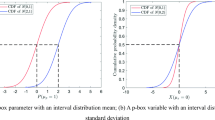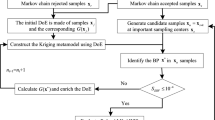Abstract
With the time-consuming computations incurred by nested double-loop strategy and multiple performance functions, the enhancement of computational efficiency for the non-probabilistic reliability estimation and optimization is a challenging problem in the assessment of structural safety. In this study, a novel importance learning method (ILM) is proposed on the basis of active learning technique using Kriging metamodel, which builds the Kriging model accurately and efficiently by considering the influence of the most concerned point. To further accelerate the convergence rate of non-probabilistic reliability analysis, a new stopping criterion is constructed to ensure accuracy of the Kriging model. For solving the non-probabilistic reliability-based design optimization (NRBDO) problems with multiple non-probabilistic constraints, a new active learning function is further developed based upon the ILM for dealing with this problem efficiently. The proposed ILM is verified by two non-probabilistic reliability estimation examples and three NRBDO examples. Comparing with the existing active learning methods, the optimal results calculated by the proposed ILM show high performance in terms of efficiency and accuracy.









Similar content being viewed by others
References
Azarm S, Mourelatos ZP (2006) Robust and reliability-based design. J Mech Des 128(4):829–831
Bae S, Kim NH, Jang SG (2018) Reliability-based design optimization under sampling uncertainty: shifting design versus shaping uncertainty. Struct Multidiscip Optim 57(5):1845–1855
Bai YC, Han X, Jiang C, Bi RG (2014) A response-surface-based structural reliability analysis method by using non-probability convex model. Appl Math Model 38(15–16):3834–3847
Ben-Haim Y (1994) A non-probabilistic concept of reliability. Struct Saf 14(4):227–245
Ben-Haim Y (1995) A non-probabilistic measure of reliability of linear systems based on expansion of convex models. Struct Saf 17(2):91–109
Ben-Haim Y, Elishakoff I (1995) Discussion on: a non-probabilistic concept of reliability. Struct Saf 17(3):195–199
Bichon BJ, Eldred MS, Swiler LP, Mahadevan S, McFarland JM (2008) Efficient global reliability analysis for nonlinear implicit performance functions. AIAA J 46(10):2459–2468
Bichon BJ, McFarland JM, Mahadevan S (2011) Efficient surrogate models for reliability analysis of systems with multiple failure modes. Reliab Eng Syst Saf 96(10):1386–1395
Bichon BJ, Eldred MS, Mahadevan S, McFarland JM (2012) Efficient global surrogate modeling for reliability-based design optimization. J Mech Des 135(1):011009
Birge B (2003) PSOt-a particle swarm optimization toolbox for use with Matlab. In: Swarm Intelligence Symposium, 2003. SIS'03. Proceedings of the 2003 IEEE. IEEE, pp 182–186
Chen ZZ, Qiu HB, Gao L, Li XK, Li PG (2014) A local adaptive sampling method for reliability-based design optimization using Kriging model. Struct Multidiscip Optim 49(3):401–416
Du X, Chen W (2004) Sequential optimization and reliability assessment method for efficient probabilistic design. J Mech Des 126(2):225–233
Echard B, Gayton N, Lemaire M (2011) AK-MCS: an active learning reliability method combining Kriging and Monte Carlo simulation. Struct Saf 33(2):145–154
Echard B, Gayton N, Lemaire M, Relun N (2013) A combined importance sampling and Kriging reliability method for small failure probabilities with time-demanding numerical models. Reliab Eng Syst Saf 111:232–240
Elishakoff I, Elettro F (2014) Interval, ellipsoidal, and super-ellipsoidal calculi for experimental and theoretical treatment of uncertainty: which one ought to be preferred? Int J Solids Struct 51(7–8):1576–1586
Ganzerli S, Pantelides CP (2000) Optimum structural design via convex model superposition. Comput Struct 74(6):639–647
Guo X, Zhang W, Zhang L (2013) Robust structural topology optimization considering boundary uncertainties. Comput Methods Appl Mech Eng 253:356–368
Hao P, Wang YT, Liu C, Wang B, Wu H (2017) A novel non-probabilistic reliability-based design optimization algorithm using enhanced chaos control method. Comput Methods Appl Mech Eng 318:572–593
Hawchar L, El Soueidy C-P, Schoefs F (2018) Global Kriging surrogate modeling for general time-variant reliability-based design optimization problems. Struct Multidiscip Optim 58(3):955–968. https://doi.org/10.1007/s00158-018-1938-y
Hu Z, Du XP (2015) First order reliability method for time-variant problems using series expansions. Struct Multidiscip Optim 51(1):1–21
Huang D, Allen TT, Notz WI, Zeng N (2006) Global optimization of stochastic black-box systems via sequential Kriging meta-models. J Glob Optim 34(3):441–466
Huang X, Chen J, Zhu H (2016a) Assessing small failure probabilities by AK–SS: an active learning method combining Kriging and subset simulation. Struct Saf 59:86–95
Huang ZL, Jiang C, Zhou YS, Zheng J, Long XY (2016b) Reliability-based design optimization for problems with interval distribution parameters. Struct Multidiscip Optim 55(2):513–528
Jiang C, Han X, Liu GR (2007) Optimization of structures with uncertain constraints based on convex model and satisfaction degree of interval. Comput Methods Appl Mech Eng 196(49–52):4791–4800
Jiang C, Han X, Liu GP (2008) A sequential nonlinear interval number programming method for uncertain structures. Comput Methods Appl Mech Eng 197(49–50):4250–4265
Jiang C, Han X, Lu GY, Liu J, Zhang Z, Bai YC (2011) Correlation analysis of non-probabilistic convex model and corresponding structural reliability technique. Comput Methods Appl Mech Eng 200:2528–2546
Jiang C, Bi RG, Lu GY, Han X (2013) Structural reliability analysis using non-probabilistic convex model. Comput Methods Appl Mech Eng 254:83–98
Jiang C, Ni BY, Han X, Tao YR (2014) Non-probabilistic convex model process: a new method of time-variant uncertainty analysis and its application to structural dynamic reliability problems. Comput Methods Appl Mech Eng 268(0):656–676
Jiang C, Qiu HB, Gao L, Cai XW, Li PG (2017) An adaptive hybrid single-loop method for reliability-based design optimization using iterative control strategy. Struct Multidiscip Optim 56(6):1271–1286
Jones DR, Schonlau M, Welch WJ (1998) Efficient global optimization of expensive black-box functions. J Glob Optim 13(4):455–492
Kang Z, Luo Y (2010) Reliability-based structural optimization with probability and convex set hybrid models. Struct Multidiscip Optim 42(1):89–102
Kang Z, Zhang W (2016) Construction and application of an ellipsoidal convex model using a semi-definite programming formulation from measured data. Comput Methods Appl Mech Eng 300:461–489
Kang Z, Luo Y, Li A (2011) On non-probabilistic reliability-based design optimization of structures with uncertain-but-bounded parameters. Struct Saf 33(3):196–205
Karuna K, Manohar CS (2017) Inverse problems in structural safety analysis with combined probabilistic and non-probabilistic uncertainty models. Eng Struct 150:166–175
Keshtegar B, Lee I (2016) Relaxed performance measure approach for reliability-based design optimization. Struct Multidiscip Optim 54(6):1439–1454
Khodaparast HH, Mottershead JE, Badcock KJ (2011) Interval model updating with irreducible uncertainty using the Kriging predictor. Mech Syst Signal Process 25(4):1204–1226
Lee TH, Jung JJ (2008) A sampling technique enhancing accuracy and efficiency of metamodel-based RBDO: constraint boundary sampling. Comput Struct 86(13–14):1463–1476
Lee I, Choi KK, Gorsich D (2013) System reliability-based design optimization using mpp-based dimension reduction method. Struct Multidiscip Optim 41(6):823–839
Li M, Azarm S (2008) Multiobjective collaborative robust optimization with interval uncertainty and interdisciplinary uncertainty propagation. J Mech Des 130(8):081402
Li M, Li G, Azarm S (2006) A Kriging metamodel assisted multi-objective genetic algorithm for design optimization. J Mech Des 130(3):405–414
Liu Y, Jeong HK, Collette M (2016) Efficient optimization of reliability-constrained structural design problems including interval uncertainty. Comput Struct 177:1–11
Lombardi M, Haftka RT (1998) Anti-optimization technique for structural design under load uncertainties. Comput Methods Appl Mech Eng 157(1–2):19–31
Lophaven SN, Nielsen HB, Søndergaard J (2002) DACE-A Matlab Kriging toolbox, version 2.0
Luo YJ, Li A, Kang Z (2011) Reliability-based design optimization of adhesive bonded steel-concrete composite beams with probabilistic and non-probabilistic uncertainties. Eng Struct 33(7):2110–2119
Majumder L, Rao SS (2009) Interval-based multi-objective optimization of aircraft wings under gust loads. AIAA J 47(3):563–575
Marelli S, Sudret B (2018) An active-learning algorithm that combines sparse polynomial chaos expansions and bootstrap for structural reliability analysis. Struct Saf 75:67–74
Meng Z, Zhou H (2018) New target performance approach for a super parametric convex model of non-probabilistic reliability-based design optimization. Comput Methods Appl Mech Eng 339:644–662
Meng Z, Hao P, Li G, Wang B, Zhang K (2015) Non-probabilistic reliability-based design optimization of stiffened shells under buckling constraint. Thin-Walled Struct 94(9):325–333
Meng Z, Zhou H, Li G, Yang D (2016) A decoupled approach for non-probabilistic reliability-based design optimization. Comput Struct 175(10):65–73
Meng Z, Hu H, Zhou H (2018) Super parametric convex model and its application for non-probabilistic reliability-based design optimization. Appl Math Model 55(3):354–370
Moens D, Vandepitte D (2006) Recent advances in non-probabilistic approaches for non-deterministic dynamic finite element analysis. Arch Comput Meth Eng 13(3):389–464
Moon MY, Cho H, Choi KK, Gaul N, Lamb D, Gorsich D (2018) Confidence-based reliability assessment considering limited numbers of both input and output test data. Struct Multidiscip Optim 57(5):2027–2043
Moustapha M, Sudret B, Bourinet JM, Guillaume B (2016) Quantile-based optimization under uncertainties using adaptive Kriging surrogate models. Struct Multidiscip Optim 54(6):1403–1421
Muscolino G, Santoro R, Sofi A (2016) Reliability analysis of structures with interval uncertainties under stationary stochastic excitations. Comput Methods Appl Mech Eng 300:47–69
Qiu Z, Elishakoff I (1998) Antioptimization of structures with large uncertain-but-non-random parameters via interval analysis. Comput Methods Appl Mech Eng 152(3):361–372
Qiu Z, Wang X, Li Z (2009) Post-buckling analysis of a thin stiffened plate with uncertain initial deflection via interval analysis. Int J Non Linear Mech 44(10):1031–1038
Ranjan P, Bingham D, Michailidis G (2008) Sequential experiment design for contour estimation from complex computer codes. Technometrics 50(4):527–541
Rashki M, Miri M, Moghaddam MA (2014) A simulation-based method for reliability based design optimization problems with highly nonlinear constraints. Autom Constr 47(11):24–36
Wang Z, Chen W (2017) Confidence-based adaptive extreme response surface for time-variant reliability analysis under random excitation. Struct Saf 64:76–86
Wang Z, Wang P (2012) A nested extreme response surface approach for time-dependent reliability-based design optimization. J Mech Des 134(12):12100701–12100714
Wang Z, Wang P (2013) A maximum confidence enhancement based sequential sampling scheme for simulation-based design. J Mech Des 136(2):021006
Yang X, Liu Y, Gao Y, Zhang Y, Gao Z (2014) An active learning Kriging model for hybrid reliability analysis with both random and interval variables. Struct Multidiscip Optim 51(5):1003–1016
Yang X, Liu Y, Zhang Y, Yue Z (2015) Probability and convex set hybrid reliability analysis based on active learning Kriging model. Appl Math Model 39(14):3954–3971
Youn BD, Choi KK (2004) A new response surface methodology for reliability-based design optimization. Comput Struct 82(2–3):241–256
Youn BD, Wang P (2008) Bayesian reliability-based design optimization using eigenvector dimension reduction (EDR) method. Struct Multidiscip Optim 36(2):107–123
Youn BD, Choi KK, Du L (2005) Adaptive probability analysis using an enhanced hybrid mean value method. Struct Multidiscip Optim 29(2):134–148
Zhang D, Han X, Jiang C, Liu J, Li Q (2017) Time-dependent reliability analysis through response surface method. J Mech Des 139(4):041404
Funding
The supports of the National Natural Science Foundation of China (Grant Nos. 11602076 and 11502063), the Natural Science Foundation of Anhui Province (Grant No. 1708085QA06), the Foundation of State Key Laboratory of Structural Analysis for Industrial Equipment from Dalian University of Technology (Grant No. GZ1702), and the Fundamental Research Funds for the Central Universities of China (Grant No. JZ2018HGTB0231) are much appreciated.
Author information
Authors and Affiliations
Corresponding author
Additional information
Responsible Editor: Byeng D Youn
Publisher’s Note
Springer Nature remains neutral with regard to jurisdictional claims in published maps and institutional affiliations.
Rights and permissions
About this article
Cite this article
Meng, Z., Zhang, D., Li, G. et al. An importance learning method for non-probabilistic reliability analysis and optimization. Struct Multidisc Optim 59, 1255–1271 (2019). https://doi.org/10.1007/s00158-018-2128-7
Received:
Revised:
Accepted:
Published:
Issue Date:
DOI: https://doi.org/10.1007/s00158-018-2128-7




